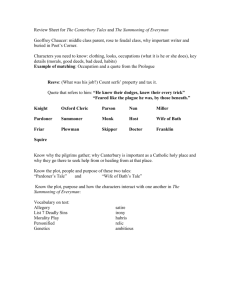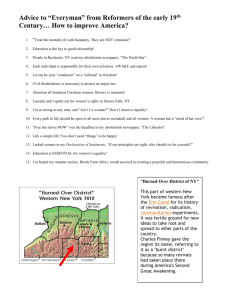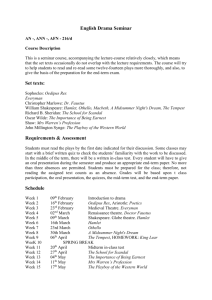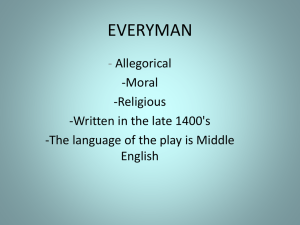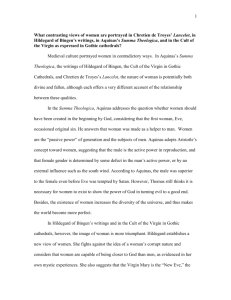EVERYMAN - rcwalton.com
advertisement
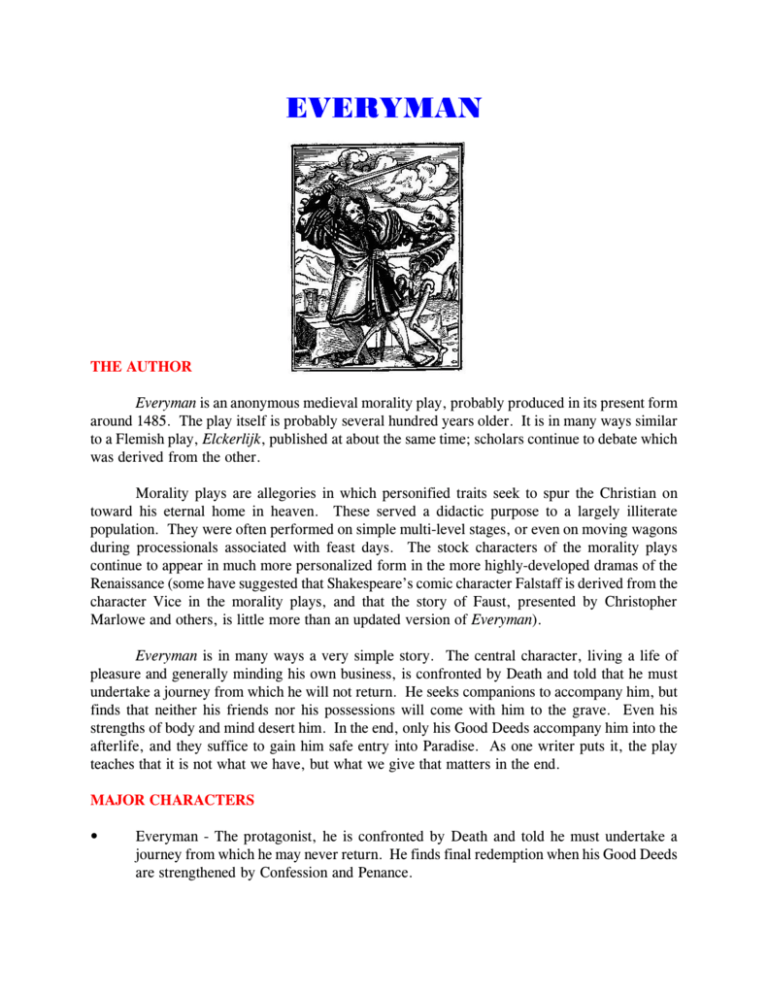
EVERYMAN THE AUTHOR Everyman is an anonymous medieval morality play, probably produced in its present form around 1485. The play itself is probably several hundred years older. It is in many ways similar to a Flemish play, Elckerlijk, published at about the same time; scholars continue to debate which was derived from the other. Morality plays are allegories in which personified traits seek to spur the Christian on toward his eternal home in heaven. These served a didactic purpose to a largely illiterate population. They were often performed on simple multi-level stages, or even on moving wagons during processionals associated with feast days. The stock characters of the morality plays continue to appear in much more personalized form in the more highly-developed dramas of the Renaissance (some have suggested that Shakespeare’s comic character Falstaff is derived from the character Vice in the morality plays, and that the story of Faust, presented by Christopher Marlowe and others, is little more than an updated version of Everyman). Everyman is in many ways a very simple story. The central character, living a life of pleasure and generally minding his own business, is confronted by Death and told that he must undertake a journey from which he will not return. He seeks companions to accompany him, but finds that neither his friends nor his possessions will come with him to the grave. Even his strengths of body and mind desert him. In the end, only his Good Deeds accompany him into the afterlife, and they suffice to gain him safe entry into Paradise. As one writer puts it, the play teaches that it is not what we have, but what we give that matters in the end. MAJOR CHARACTERS • Everyman - The protagonist, he is confronted by Death and told he must undertake a journey from which he may never return. He finds final redemption when his Good Deeds are strengthened by Confession and Penance. • Death - Sent by God to summon Everyman to his final reward. • Fellowship, Kindred, Cousin, Goods - Those on whom Everyman had relied during his life refuse to accompany him into the afterlife. • Good Deeds - A weak figure who grows stronger as the play progresses, and ultimately accompanies Everyman to his final home. • Knowledge - Orthodox doctrine is essential to Everyman’s safe passage. • Confession - Confessing his sins and doing penance strengthen the severely weakened Good Deeds for the journey. • Beauty, Strength, Discretion, Five Wits [Senses] - Though these are good, they, too, desert Everyman when he is on the verge of death. NOTABLE QUOTATIONS “I perceive, here in my majesty, How that all creatures to me be unkind, Living without dread in worldly prosperity: Of ghostly sight the people be so blind, Drowned in sin, they know me not for their God; In worldly riches is all their mind, They fear not my righteousness, the sharp rod.” (God, lines 22-28) “I lie here in corners, trussed and piled so high, And in chests I am locked so fast, Also sacked in bags. Thou mayest see with thine eye I cannot stir; in packs low I lie.” (Goods, lines 394-397) “Here I lie, cold in the ground; Thy sins hath me sore bound, That I cannot stir.” (Good Deeds, lines 486-488) “I know your sorrow well, Everyman. Because with Knowledge ye come to me, I will comfort as well as I can, And a precious jewel I will give thee, Called penance, voider of adversity; Therewith shall your body chastised be, With abstinence and perseverance in God’s service. (Confession, lines 554-560) “For the blessed sacraments pure and benign He beareth the keys, and thereof hath the cure For man’s redemption - it is ever sure Which God for our soul’s medicine Gave us out of his heart with great pine. Here in this transitory life, for thee and me, The blessed sacraments seven there be: Baptism, confirmation, with priesthood good, And the sacrament of God’s precious flesh and blood, Marriage, the holy extreme unction, and penance; These seven be good to have in remembrance, Gracious sacraments of high divinity.” (Five Wits, lines 716-727) “Now he hath suffered that we all shall endure; The Good Deeds shall make all sure.” (Knowledge, lines 888-889) “Hereabove thou shalt go Because of thy singular virtue. Now the soul is taken the body fro, Thy reckoning is crystal-clear. Now shalt thou into the heavenly sphere, Unto the which all ye shall come That liveth well before the day of doom.” (Angel, lines 895-901) NOTES After an opening prologue, God complains of the fact that the people of earth are seeking their own pleasure rather than living in righteousness. He then summons Death and tells him to seek out Everyman and summon him to a pilgrimage from which he will never return. Death seeks out Everyman and summons him for his final reckoning, but Everyman protests that he is not ready and tries to bribe Death to give him more time. Everyman then asks if he might not take companions with him on the journey; Death agrees, if he can find anyone willing to go. Everyman first encounters Fellowship, who agrees to go with him on his journey, even if it leads to hell. When Everyman tells him that it is Death who has summoned him, however, Fellowship retracts his promise and quickly exits the scene. Everyman then seeks out Kindred and Cousin, both of whom swear to stand by him, but make ridiculous excuses (Cousin claims he has a toe cramp and Kindred offers to send his maid along instead) and turn aside when they find out he is going to make his final reckoning. After his friends and family desert him, Everyman turns to his Goods, hoping that his wealth can see him safely through the Pearly Gates. But Goods claims he is too brittle to make the journey, and avers that he commonly destroys souls rather than saving them. In desperation, Everyman turns to Good Deeds, but finds that she is so weak that she cannot even stand up. She says she would willingly accompany Everyman on his journey if she were able, but regrets that she cannot. She then advises him to seek after her sister Knowledge. Knowledge arrives and promises to accompany Everyman to his reckoning, then leads him to Confession. Confession then gives him a whip to do penance to purge his sin. Everyman then gives praise to God for his provision of grace. After he scourges himself, Good Deeds rises, now obviously strong enough to make the journey. As Everyman goes on his journey accompanied by Good Deeds and Knowledge, his companions advise him to bring along four other characters - Beauty, Strength, Discretion, and Five Wits (five senses). They agree to accompany him. As they journey, Five Wits advises Everyman to take the sacraments and thus receive the grace he needs to enter heaven; Everyman does so. He then arrives at his grave, and, one by one, Beauty, Strength, Discretion, and Five Wits leave him. Good Deeds alone accompanies him into the grave as he passes to eternal salvation. ESSAY QUESTIONS Discuss the following in a five-paragraph essay: 1. The medieval morality play Everyman appeared in its present form in 1485, on the eve of the Protestant Reformation. How does the play reflect the Roman Catholicism of the late fifteenth century? Be sure to discuss both doctrinal issues and matters of church practice. 2. The medieval morality play Everyman appeared in its present form in 1485, on the eve of the Protestant Reformation. Does the play reflect the tensions in the church that were to produce a massive revolt only three decades later? If so, how? If not, why not? Consider both the overt comments about the priesthood and the characterizations of various allegorical figures. 3. Compare and contrast the journeys from sin to salvation recorded in Dante’s Inferno and the morality play Everyman. Do the two stories convey the same message? Do they have the same focus? What accounts for their similarities and differences? 4. Compare and contrast the spiritual journeys of the soul recorded in Dante’s Inferno and the morality play Everyman, particularly with regard to their fidelity to the theology of the Catholic Church. In what ways do their visions of the spiritual life differ? Be specific. 5. Compare and contrast the pictures of sin recorded in Dante’s Inferno and the morality play Everyman, particularly with regard to their differing emphases. Recognize as you do this that the Inferno is merely the first part of a trilogy that covers the same ground as that found in the morality play. Be sure to cite specifics in your discussion of the two works. 6. Discuss the similarities and differences between the two protagonists of Dante’s Inferno and Everyman. Is the character of Dante in his poem a universal figure, or does his connection to the life of the poet limit the universal applicability of his experience in comparison to the protagonist of the morality play? Why or why not? Illustrate your answer with specifics from the two works. 7. Compare and contrast the two sets of companions who appear in Everyman. How are they different from one another? Do they leave Everyman for the same reasons? How do the two groups help to bring out the major themes of the play? 8. Discuss the relationship between grace and works in Everyman. What can you discern about the Catholic understanding of grace from the way the term is used in the play? Be specific. 9. Everyman is the best known of the English morality plays. Does the classification fit? What is there about Everyman that deserves the appellation “morality play”? 10. Morality plays like Everyman address the most primal fear of mankind - the fear of death. How does the play seek to prepare the audience to deal with their own mortality? Is it effective in doing so? Why or why not? 11. In Everyman, the protagonist is accompanied, at least briefly, by many companions on his journey. Given the allegorical nature of the work, what can you conclude about the playwright’s assessment of the relative value of different characteristics and aspects of human life? Do you agree with his assessment? Why or why not? 12. Discuss the plan of salvation presented in Everyman. Does the playwright insist that salvation is through Christ alone? Why or why not? 13. Discuss the extent to which Christopher Marlowe’s Doctor Faustus is like medieval morality plays such as Everyman. What characteristics do the plays have in common? In what critical ways are they different? Do the differences help to clarify the distinctive characteristics of the Renaissance in its rebellion against the Middle Ages? 14. John Bunyan’s Pilgrim’s Progress may be viewed as the spiritual autobiography of a Christian Everyman. Compare and contrast Bunyan’s great work with the medieval morality play Everyman. Give special attention to the theology of the two works. To what extent are the differences due to the fact that one work is Protestant while the other is Catholic?


